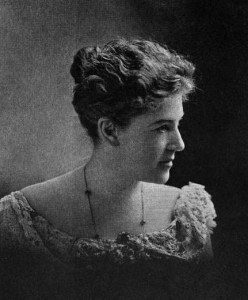 Last December, I wrote about the necessity of grief when discussing “Sorrow’s Uses,” by Ella Wheeler Wilcox. Today, I’m looking at a poem called “A Song of Life,” by the same author, but which has a very different tone (though all Ella Wheeler Wilcox’ poems are wonderful). It’s about letting go of sadness in order to live life to the fullest. The poet shares how ecstatic and grateful she is for her life, and then goes on to say that learning how to be happy is the secret of life.
Last December, I wrote about the necessity of grief when discussing “Sorrow’s Uses,” by Ella Wheeler Wilcox. Today, I’m looking at a poem called “A Song of Life,” by the same author, but which has a very different tone (though all Ella Wheeler Wilcox’ poems are wonderful). It’s about letting go of sadness in order to live life to the fullest. The poet shares how ecstatic and grateful she is for her life, and then goes on to say that learning how to be happy is the secret of life.
Wilcox opens, “In the rapture of life and of living,/I lift up my head and rejoice…” (1-2). She is so delighted with her situation that she simply cannot help but relish it. She credits “the great Giver” (3) for “giving/The soul of [her] gladness a voice” (3-4); you would think that she is setting this up to be a religious poem, but that’s not the case. In the third verse, she expresses her thanks to “Apollo,/The god of the beautiful days” (17-18). Though she is really speaking of the sun directly (she later says she is lost in its rays), she is still making a polytheistic statement; therefore it doesn’t matter so much who or what you believe to be a higher power, but rather that you are appreciative of what you have.
Because Wilcox is enjoying everything around her, like “the glow of the glorious weather” (5) and “the sweet-scented, sensuous air” (6), her problems seem insignificant. As she puts it, “My burdens seem light as a feather –/They are nothing to bear” (7-8). Her worries melt away as she puts everything in perspective. Besides natural things, the poet mentions cherishing “the pleasure of wealth” (10); but again she misleads the reader, as she is actually referring to her “dower” (11) of “talents and youth-time and health” (12). We may not all be perfect, but we all have our own good qualities and skills. Rather than focusing on the negatives, Wilcox focuses on the positives: “…he is most wise in all ages/Who knows how to be glad” (15-16). This is the message she tries to teach the reader for the rest of the poem.
As she says in the next stanza, “Are you troubled and sad? I beseech you/Come out of the shadows of strife” (17-18). Wilcox does not believe that anyone should dwell on their misfortunes, she believes that we should shake them off: “Come out in the sun while I teach you/The secret of life” (19-20). The poet believes that she has the answers, and she wants to share them with everyone.
Wilcox gives out even more good advice in the poem’s last stanza:
Come out of the world – come above it –
Up over its crosses and graves,
Though the green earth is fair and I love it,
We must love it as masters, not slaves. (25-28)
If we can just step outside of ourselves, even if only momentarily, we’ll be able to see everything more clearly. We can even overcome the grief that follows a death. It’s essential that we have control over our own lives, that we be the “masters,” so that we can cherish it even more. According to Wilcox, being “above” the problems in our lives makes it so that everything is pleasant: “Come up where the dust never rises –/But only the perfume of flowers…” (29-30); everything is sweet when you’re not stressing over life’s issues.
If we do this, if we learn to let go of our sadness, we can embrace life more fully. We can free our minds from anxiety and truly live in the present moment. And if we manage to do that, we can feel about life the way Ella Wheeler Wilcox does: “And your life shall be happy as mine is,/And as full of delight” (35-36). Who wouldn’t want that?
Top Photo Credit: moot.typepad.com
Wilcox Photo Credit: voiceseducation.org
Related Reading:
- Find out more about the poet
- “Preserving the Moment” (SevenPonds)

 “Sorrow’s Uses” by Ella Wheeler Wilcox
“Sorrow’s Uses” by Ella Wheeler Wilcox




 Did Our Ancestors Leave Behind a Map of the Afterlife?
Did Our Ancestors Leave Behind a Map of the Afterlife?
 My Dear Cousin Is Still An Angel at My Side
My Dear Cousin Is Still An Angel at My Side














